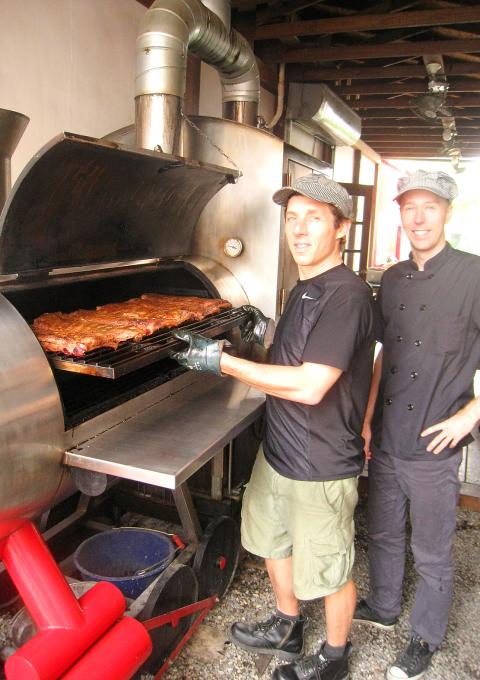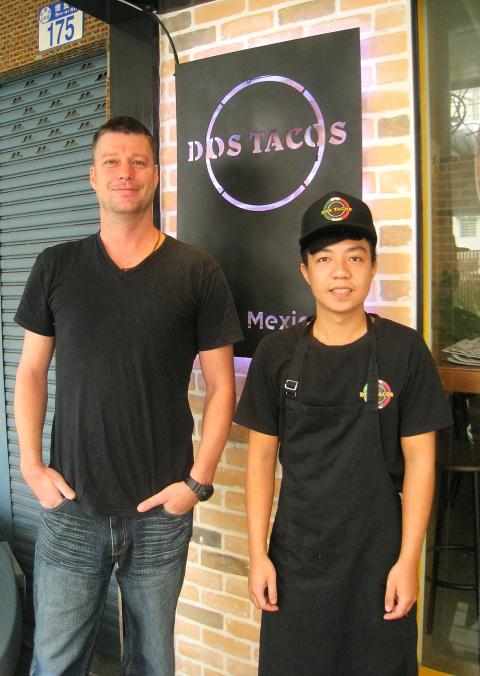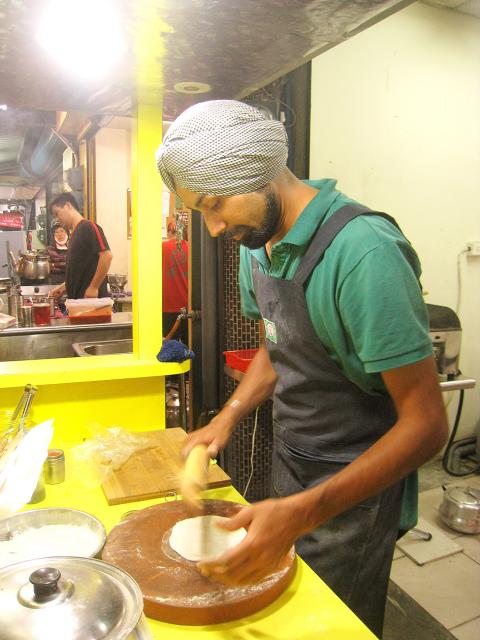Hualien is sometimes described as Taiwan’s Eden. The clean air and slower pace of life are attractive to many, not least members of Taiwan’s foreigner community, who visit for the surfing, trekking, cycling, bird watching and myriad other outdoor activities. Some of them have come and stayed. In recent months, Hualien has seen a small burgeoning of foreign-run eateries, which have greatly diversified the county’s food profile.
Salt Lick
Most prominently located is Salt Lick (火車頭), which opened eight months ago on Hualien’s busy Chongshan Road (中山路) with a specialty in American southern-style barbeque. A second recent opening is Dos Tacos, serving up Tex-Mex, also centrally located in Hualien’s downtown area. A little off the beaten track is Jass Kathi Roll, providing a taste of India.

Photo: Ian Bartholomew
Salt Lick has been built from the ground up by Jason Delickta, 38, from Michigan and Benjamin Mercer, 29, from Alaska, who had talked about starting a restaurant while both were studying in Taipei. They finally opened Salt Lick in late April. Both have a background in catering and wanted to introduce a different kind of American food to Taiwan.
“There are not many authentic American restaurants in Taiwan, and most Taiwanese don’t know what authentic American food is. They think it’s hamburgers, and maybe pizza. We want to expand their knowledge a little bit,” Delickta said, numbering off the restaurant’s signature dishes: Texas brisket, Kansas City ribs and the pulled pork from the Carolinas, all made using a smoker that was built in Hualien to Delickta’s own design.
“The idea of what a barbeque is for Taiwanese is much different from our idea, so in some way we wanted to introduce them to real American-style barbecue … Taiwanese really love to eat meat and this was a different style for them to try,” Mercer said.

Photo: Ian Bartholomew
In creating Salt Lick, Delickta and Mercer were committed to creating something particularly their own. The pair did much of the construction and renovation work on the restaurant, with help from friends.
“Many people who saw us working on the place thought we were doing this to save money. Our reason is that we wanted this place to be ours, from the ground up,” Mercer said.
The same applies to the food and Salt Lick is committed to making things from scratch, from the sauces, potato chips and particularly the time-consuming process of cooking the brisket, ribs and pork shoulder to mouthwatering tenderness.

Photo: Ian Bartholomew
Creating Salt Lick is part of a journey for both owners, said Mercer: “We both wanted a big new experience to have [in Taiwan].”
“It is taking living in another country to the next level,” Delickta said, adding that opening the restaurant had opened his eyes to many new aspects of Taiwanese society that he had never experienced before.
Salt Lick is located at 147 Chongshan Rd, Hualien City (花蓮市中山路147號). Tel: (03) 833-2592. Open 11:30am to 2:30pm; 5pm to 11pm.
Dos Tacos
Jason Crawford, 38, is another young entrepreneur who set his sights on Hualien for his first business venture, Dos Tacos, which opened in July. Crawford came to Hualien two years ago, after he fell in love with the city and knew that he had to move there.
“It’s like a tropical Vancouver Island, where I lived. You got the mountains, you got the clean air, you got the ocean, and surfing,” he said.
“But when I got to Hualien: No Mexican food!” Looking to start a business of his own, Crawford saw his opening. Crawford said that Mexican food has always been a big favorite of his, and he had often cooked it for friends. He now aimed to introduce it to Hualien.
Going from English teacher to restaurant owner, Crawford said the experience had changed his perceptions of the city.
“I have met so many new people. It has been more of a networking thing,” Crawford said about his interaction with local business owners, staff and clientele.
Crawford is in the process of adding to his menu of Tex-Mex standards like tacos and burritos. He has recently extended to chimichangas and empanadas, and is looking to find a local hook with additions such as fish tacos.
“I want something from the sea, and Hualien being a seaside place, you know … I also want to do a mango salsa, so I can use the mango when in season.”
As with Salt Lick, Crawford aims to maximize usage of in-house and local produce. “I have been toying with making our own taco shells and tortilla chips,” Crawford said. Many of the sauces are produced at Dos Tacos, Crawford emphasizing that condiments such as the salsa fresco are made fresh daily. “No food processors. It’s all done with a hand and knife, and lots of elbow grease.”
“When you bite into a burrito or a taco you can taste it, that zap of freshness, from this morning, the onions, the cilantro, the lime. When you get store-bought, it just doesn’t have that freshness. I want people to come in and immediately know that this isn’t a Taco Bell kind of experience. Doing it fresh. It’s the way to go.”
As a first-time restaurant owner/chef, Crawford discovered unsuspected depths of satisfaction in his new profession. “I always liked cooking, but I didn’t know how much I enjoyed it. Sometimes when you work with your hands and you make something that can bring someone else enjoyment, at the end of the day, you feel good.”
Dos Tacos is located at 177 Boai Rd, Hualien City (花蓮市博愛路177號). Tel: (03) 831-1733. Open: 11:30am to 2:30pm; 6pm to 9:30pm, closed Tuesdays.
Jass Kathi Roll
One of the newest ventures, opened in September, is Jass Kathi Roll run by Paramjeet Singh, 27, from India’s Punjab region, who recently moved to Hualien to be with his Taiwanese wife.
Singh, who worked as a regional manager for Nike and Reebok back home, has entered the catering business by way of finding employment in his new abode. Although not a trained chef, he comes from a family with strong culinary roots and is a firm believer that cooking is in his blood. He also wants to give an authentic representation of Indian food to Taiwanese, and this insistence extends to having the spices he uses for his kathi roll sent to him by his mother from India.
The first order of business was to find a type of Indian food that he could produce to his own exacting standards of authenticity and which might appeal to consumers in Hualien. Originally he considered serving dosa, a south Indian dish made with rice, but found that Taiwanese rice was not suitable for this dish.
“I was looking, but I don’t know the language, so what could I do? I couldn’t do trading or anything like that. I came to the conclusion I have to bend myself according to the culture and find something.” He decided on the kathi roll, a popular dish all over India, and learned to make it over a period of a month. The roll, available in a chicken or vegetarian preparation, is wrapped in a handmade roti.
Now he has a stall at the entrance to a haberdashery. Despite the small scale of the operation, Singh has high aspirations to bring authentic Indian food to Hualien.
Singh’s kathi roll has the huge advantage of being made from scratch, and as with Salt Lick and Dos Tacos, finds a point of departure not just in an entrepreneurial drive, but also in hands-on relationship to the food served.
“Spices are a main ingredient in Indian food. If I am going to say my food is ‘the taste of India,’ it should be that. I don’t want to use two types of Indian spices, then mix in three Taiwanese spices. I want to give them the actual taste [of food from India]. Because I am the only person in Hualien [selling Indian food], and I am representing India,” Singh said.
As a new arrival in Hualien, Singh said he was gradually learning the ins and outs of business here. Already he said that neighboring stall owners had warned him that serving up such generous portions is no way to make money.
For Singh, the kathi roll is a first step in an exploration of what kinds of Indian food will appeal to Taiwanese, and he is now planning to serve up Indian-style vegetable soups to cater to customers during the cool winter months.
Jass Kathi Roll is located at 257 Jianguo Rd Sec 2, Hualien City (花蓮市建國路二段257號). Open 4pm to 10pm, closed Thursdays.

President William Lai (賴清德) yesterday delivered an address marking the first anniversary of his presidency. In the speech, Lai affirmed Taiwan’s global role in technology, trade and security. He announced economic and national security initiatives, and emphasized democratic values and cross-party cooperation. The following is the full text of his speech: Yesterday, outside of Beida Elementary School in New Taipei City’s Sanxia District (三峽), there was a major traffic accident that, sadly, claimed several lives and resulted in multiple injuries. The Executive Yuan immediately formed a task force, and last night I personally visited the victims in hospital. Central government agencies and the

Australia’s ABC last week published a piece on the recall campaign. The article emphasized the divisions in Taiwanese society and blamed the recall for worsening them. It quotes a supporter of the Taiwan People’s Party (TPP) as saying “I’m 43 years old, born and raised here, and I’ve never seen the country this divided in my entire life.” Apparently, as an adult, she slept through the post-election violence in 2000 and 2004 by the Chinese Nationalist Party (KMT), the veiled coup threats by the military when Chen Shui-bian (陳水扁) became president, the 2006 Red Shirt protests against him ginned up by

As with most of northern Thailand’s Chinese Nationalist Party (KMT) settlements, the village of Arunothai was only given a Thai name once the Thai government began in the 1970s to assert control over the border region and initiate a decades-long process of political integration. The village’s original name, bestowed by its Yunnanese founders when they first settled the valley in the late 1960s, was a Chinese name, Dagudi (大谷地), which literally translates as “a place for threshing rice.” At that time, these village founders did not know how permanent their settlement would be. Most of Arunothai’s first generation were soldiers

Among Thailand’s Chinese Nationalist Party (KMT) villages, a certain rivalry exists between Arunothai, the largest of these villages, and Mae Salong, which is currently the most prosperous. Historically, the rivalry stems from a split in KMT military factions in the early 1960s, which divided command and opium territories after Chiang Kai-shek (蔣介石) cut off open support in 1961 due to international pressure (see part two, “The KMT opium lords of the Golden Triangle,” on May 20). But today this rivalry manifests as a different kind of split, with Arunothai leading a pro-China faction and Mae Salong staunchly aligned to Taiwan.